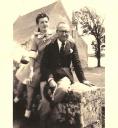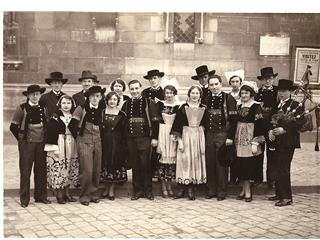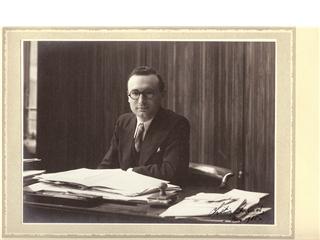Yann – Jean on the social register – Fouéré was born in Gascony on the 26th July 1910. His father, Jean Fouéré, from a Breton farming family in the region of Dinan, was a senior civil servant of the State Revenue’s administration and spent most of his career outside of Brittany. His mother, of the Liegard family from the Trégor region, was clearly more socially privileged.
At an early stage of Yann Fouéré’s life, the family returned to Brittany. He spent most of his youth in Callac, close to a maternal great grandmother who was born in 1838. He says that “It was most probably Callac that made the call of the old country irresistible later on”.
 1922 Yann Fouéré’s First Communion at Saint Charles
1922 Yann Fouéré’s First Communion at Saint Charles
The young Fouéré started his secondary education in St Brieuc where he was sent to stay with his maternal grandmother. However he soon rejoined his parents in Paris, his father being employed in the Ministry of Public Works under Yves Le Troquer from Guingamp. Yann continued his schooling at the Lycée Montaigne and at Louis Le Grand, but moved once again with his civil servant father to Clermont dans l’Oise where he did his baccalaureate in 1927.
1917 Yann Fouéré with the group Korollerien Breiz-Izel, back on the right. His father, Jean Fouéré, 3rd from the left at the back.
In the years following his baccalaureate, the young Fouéré discovers his passion for Brittany and Breton culture: He subscribes to Breiz Atao, the Breton nationalist movement’s publication, and immerses himself in the history of Brittany.
Returning to Paris to attend the Law Faculty and the Political Science School, Yann Fouéré mingles with the Breton militants of Paris. Subsequently, he is elected president of the Association of Breton Students in Paris (1933-37). He delivers a conference at the Celtic Congress in Dinard on ‘Les Saints Bretons et leur Oeuvre Nationale”, which is later published as a booklet. In 1934, having obtained his Degrees in Law, Arts and Political Science, he enters the Ministry of the Interior.
1934 Yann Fouéré at the Ministry of the Interior
At the age of 24, Yann Fouéré, henceforth autonomous, creates with Robert Audic the Ar Brezhoneg er Skol association(ABES), which campaigs for the teaching of Breton in Brittany’s state schools. The majority of municipal councils – three hundred and forty six of them – and three general councils give their support to the ABES campaign.
Due to the success of this campaign, Yann Fouéré finds himself, in his own words, “bombarded”, into the position of vice-president for the Union Régionaliste Bretonne(1939-45). He becomes involved in the activities of the Union Fédérale for young people, the most powerful of the ex-servicemen’s organisations, recognised as belonging to the more left wing circles. As one of the U.F.’s youth group’s National Commissioners, Yann Fouéré takes part in numerous international gatherings from New York to Bucharest, which further exposes him to the problems of national minorities. Soon after, he becomes the director and main contributor of “Peuples et Frontieres”, a publication for various autonomist parties.
Confronted with the mounting perils in Europe, Yann Fouéré refuses to subscribe to any ideologies “ whether right-wing or left-wing, whose concrete application always results in the same thing for the people, with no progress for them” .
Towards the end of 1936, Yann Fouéré meets his future wife, Marie-Magdaleine Mauger, a young woman from the Trégor region who has come to Paris to seek employment like many of her compatriots. They are married at the beginning of the Second World War while Marie Magdaleine is a secretary at the Town Hall in the 6ème arrondissement.
 1942 Marie Madeleine and Yann Fouéré
1942 Marie Madeleine and Yann Fouéré
A good career at the Ministry of the Interior opens up before the young militant. He divides his time between numerous activities, those of Ar Brezhoneg Er Skol becoming the most prominent. The editing of “Peuples et Frontieres” leads him to the realisation that he has to create a more powerful regional newspaper to provoke a demand for the reestablishment of the province of Brittany, without offending a Breton population faithful to those in authority. Alas, the war was to thwart all these plans.



like reading the web log and see that the journey you are connected decide charge a really valuable journey toward the condition of others. Thank!